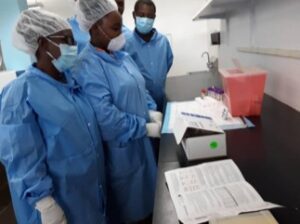
COVID-19 has already left its mark on most of the world, and now it is slowly striking at the Island of Haiti. The country is still experiencing severe poverty for over a decade and vastly underprepared to manage this global health crisis.
After being the first country liberated from colonialism, lack of resources began the tragic history of hardship and poverty. More recently, the countries fortune declined worse after a series of massive earthquakes reaching up to a 7.0 magnitude.
Today approximately 11.3 million people reside on the island that has only 64 ventilators, half of which are not functioning. Haiti does not have the proper resources needed to treat Covid-19 as well as resources needed to learn online.
In some countries, poverty makes reliable preparation for the virus very slim. As for Haiti, because of its public infrastructure, there is a lack of resources that has caused the island to be in severe need of help.
The virus has caused many people within the medical industry in Haiti to be scared to come to work. Doctors and Nurses have a huge fear of contracting the deadly virus, according to the associated press.
Dr. Jeb Sprague says healthcare professionals refuse to work under these conditions.
“The state university of Haiti doctors and nurses did not show up to work, they are afraid that they will get COVID,” he said.
Doctors and nurses are still being trained to use the COVID-19 rapid test. Without sustainable healthcare, how will the people of Haiti survive this global pandemic?
Fortunately, 350 Cuban doctors and medical specialists arrived in the country days ago, to provide medical assistance to curtail as much of the death toll as possible. This small team is a step in the right direction, but the country has a long road ahead.
According to the Washington Post, studies have shown that there are 72 people confirmed with this virus, 2 recovered and 5 deaths. Though incomparable to the global rate, the virus is very contagious.
Jean Robert Clairvin has worked as a banker of Central Bank of Haiti for fifteen years and resident of Port-au-Prince. He fears things will only get worse for the country.
“Haiti is not like America, the Street market is a daily thing that occurs in this Country,” Clairvin said. “I am scared for my people, when will there be an end to our misery?”
With Haiti having a 40% unemployment rate their economic activity is involved in a small economy. They are not able to hide away or self-quarantine. They must go outside daily to get things they need.
Online schooling has been another huge challenge for the country, now that schools are shut down in Haiti.
Darline Azor, an employee at the school Board of Haiti has been working there for about seventeen years as a Teacher. Azor explains that Port-au-Prince has also been dealing with electricity issues.
“Because this city does not have good electricity, not everyone is able to own a laptop, cellular device, or internet,” Azor said.
Electricity is not the only thing stopping students from learning at home. Many students in Haiti simply do not have access to computers or laptops. For most students in Haiti, education is everything to them. People pray to receive a good education for a better tomorrow.